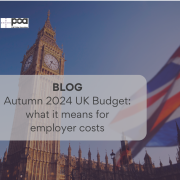Preparing your business for Q4: Essential HR strategies for a strong finish to the year
As the final quarter of the year approaches, businesses across the UK gear up for what can often be the busiest and most crucial part of the year. For HR teams, the last few months of the year are an essential time to assess, plan, and adjust strategies to ensure both compliance with changing regulations and the achievement of end-of-year goals.
With new employment law changes on the horizon following the July 2024 general election (link to June’s blog), it’s more important than ever for businesses to refine their HR practices to meet both internal objectives and legal requirements.
In this blog, we will explore key HR strategies to focus on as Q4 begins, taking into account the proposed employment law changes discussed earlier in the year, and provide actionable advice for both company owners and HR professionals.
Review and update policies for compliance
One of the most pressing concerns for businesses as we approach Q4 is ensuring compliance with the upcoming employment law changes proposed in the July 2024 election. The Labour Party has pledged significant reforms aimed at improving workers’ rights, including:
- Day-one employment rights: Employees will be entitled to parental leave, sick pay, and protection from unfair dismissal from day one of their employment, potentially after a short probationary period.
- Flexible working: The Labour government intends to make flexible working the default for all employees from their first day of work, unless an employer can prove that it is not feasible for their role.
- Ban on zero-hour contracts: Employers will no longer be able to hire workers on zero-hour contracts, which will require changes to staffing and scheduling for certain sectors.
- Strengthening of family-friendly policies: This includes making it unlawful to dismiss a new mother for six months after her return from maternity leave.
With these significant changes looming, HR teams should be reviewing current policies to ensure they align with the new legal framework. Compliance is not just about avoiding legal risks; it’s also about fostering a fair and supportive workplace that can help businesses attract and retain top talent.
Plan for performance reviews and year-end appraisals
Q4 is the prime time for conducting performance reviews and year-end appraisals. This is an opportunity to assess employee performance, provide feedback, and set goals for the next year.
As you approach these evaluations, consider the following:
- Prepare managers: Ensure that managers are equipped with the tools and training they need to conduct fair and constructive performance reviews. Given the shift toward flexible working and changing workplace dynamics, managers may need to focus more on outcomes and less on the traditional metrics of attendance or time spent at the desk.
- Align with company goals: Performance appraisals should be tied to the broader objectives of the business. Whether you are focusing on boosting productivity, driving innovation, or improving customer service, ensure that individual goals align with your company’s strategic direction.
- Employee development: Use performance reviews as an opportunity to discuss employee development. What additional training or support might they need in the coming year? Do they have ambitions to grow within the company? Investing in staff development now can set the stage for a more productive 2025.
Address mental health and wellbeing
As discussed in the earlier blog on employment law changes, mental health is becoming a critical issue in the workplace, with disability discrimination claims related to mental health conditions such as stress, anxiety, and depression rising sharply. Q4 can be a particularly stressful time for employees, given the pressure to meet year-end goals and balance work with personal commitments.
To manage this, HR teams should take proactive steps to support employee wellbeing:
- Mental health support: Consider implementing mental health support programs or providing access to counselling services. Employees should know that their mental health is valued, and that help is available if they need it.
- Flexible working arrangements: As flexible working becomes the default, it’s essential to consider how these arrangements can be structured to reduce stress and improve work-life balance. Allowing employees to adjust their schedules to accommodate personal responsibilities especially during school holidays can have a significant impact on their overall wellbeing.
- Encourage time off: Ensure employees are using their holiday allowances and taking time off when needed. Burnout is a real risk during the last quarter, and encouraging rest can boost morale and productivity.
Plan for holiday cover
Half term holidays, and the festive season are often the busiest time of year for many businesses, which can create challenges when it comes to scheduling staff. Without careful planning, the combination of increased workload and employee holidays can result in understaffing and reduced productivity.
To manage holiday coverage effectively:
- Create a staffing plan early: Start planning early to ensure you have adequate cover during peak periods. Identify critical roles and ensure there are trained team members who can step in if needed.
- Cross-train employees: Cross-training employees to handle different tasks can help ensure that operations run smoothly, even when key staff are on holiday. This also fosters a culture of collaboration and skill development within the team.
- Flexible leave policies: While it’s important to ensure sufficient coverage, offering flexible holiday options can prevent burnout and improve employee satisfaction. Where possible, allow employees to stagger their time off or work remotely during holiday periods.
Budget planning for 2025
Q4 is not just about finishing the year strong; it’s also about planning for the year ahead. For HR teams, this means working closely with leadership to develop the HR budget for 2025.
Several of the proposed employment law changes may have budget implications for businesses, such as:
- Statutory Sick Pay (SSP): The Labour government has proposed removing the lower earnings limit and the waiting period for SSP, making it available to all workers. Businesses will need to factor this into their financial planning, as it could increase the cost of employee absence.
- Mandatory pay gap reporting: The draft Equality (Race and Disability) Bill includes provisions for mandatory ethnicity and disability pay gap reporting. Large businesses with more than 250 employees should begin preparing now by reviewing their payroll data and planning for the additional administrative work that may be required.
- Investment in technology: To support flexible working and improve efficiency, many businesses may need to invest in new technology or upgrade existing systems. Whether it’s video conferencing tools, project management software, or HR management systems, now is the time to budget for these improvements.
- Addressing resource gaps: Will there be a requirement in 2025 to increase your employee head count to support any growth plans that the business has? If so, what is the cost of this additional resource that will need to be added to the budget?
Communicate and prepare for change
As HR teams navigate the changes brought on by new employment laws and the challenges of Q4, communication is key. Employees need to be kept informed about any changes to policies, expectations, or working conditions, particularly if these changes relate to compliance with new regulations.
- Internal communications: Regular updates through internal communications channels, such as newsletters or team meetings, can help ensure that employees understand what’s expected of them and how the company is preparing for the future.
- Training and development: If new laws are going to affect the way employees work, consider providing training sessions to ensure they are fully aware of their rights and responsibilities.
As we move into Q4, it’s essential for HR teams and business owners to be proactive in preparing for both the final stretch of the year and the upcoming changes to employment law.
By focusing on compliance, employee wellbeing, holiday planning, and budget forecasting, businesses can position themselves for a strong finish to 2024 and lay the groundwork for success in 2025.
At Phil Collier Associates, we’re here to support you through these changes. Whether you need help understanding new employment laws or developing HR strategies for the year ahead, our expert team is ready to assist. Contact us today to learn more about how we can help your business thrive in the months to come.


